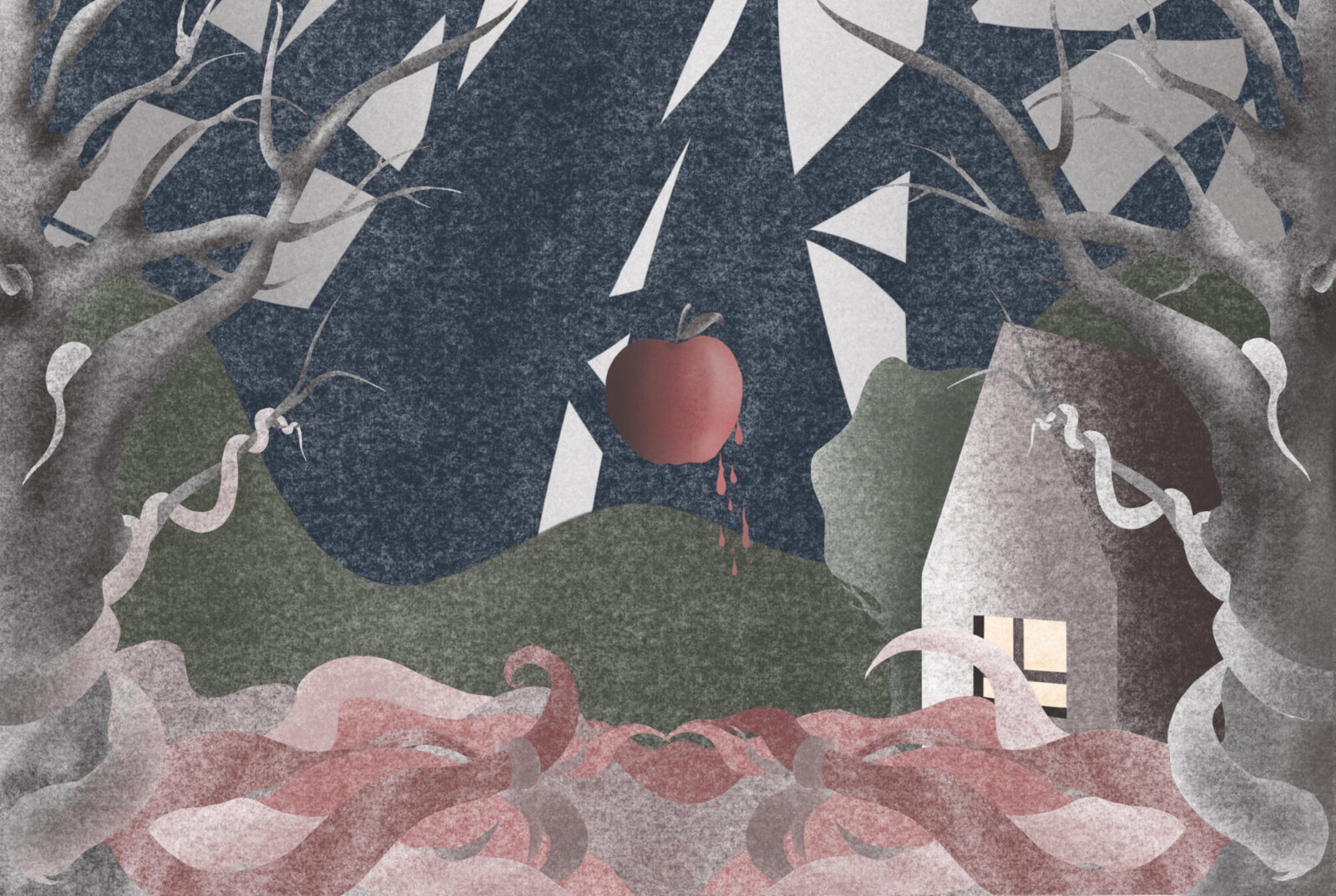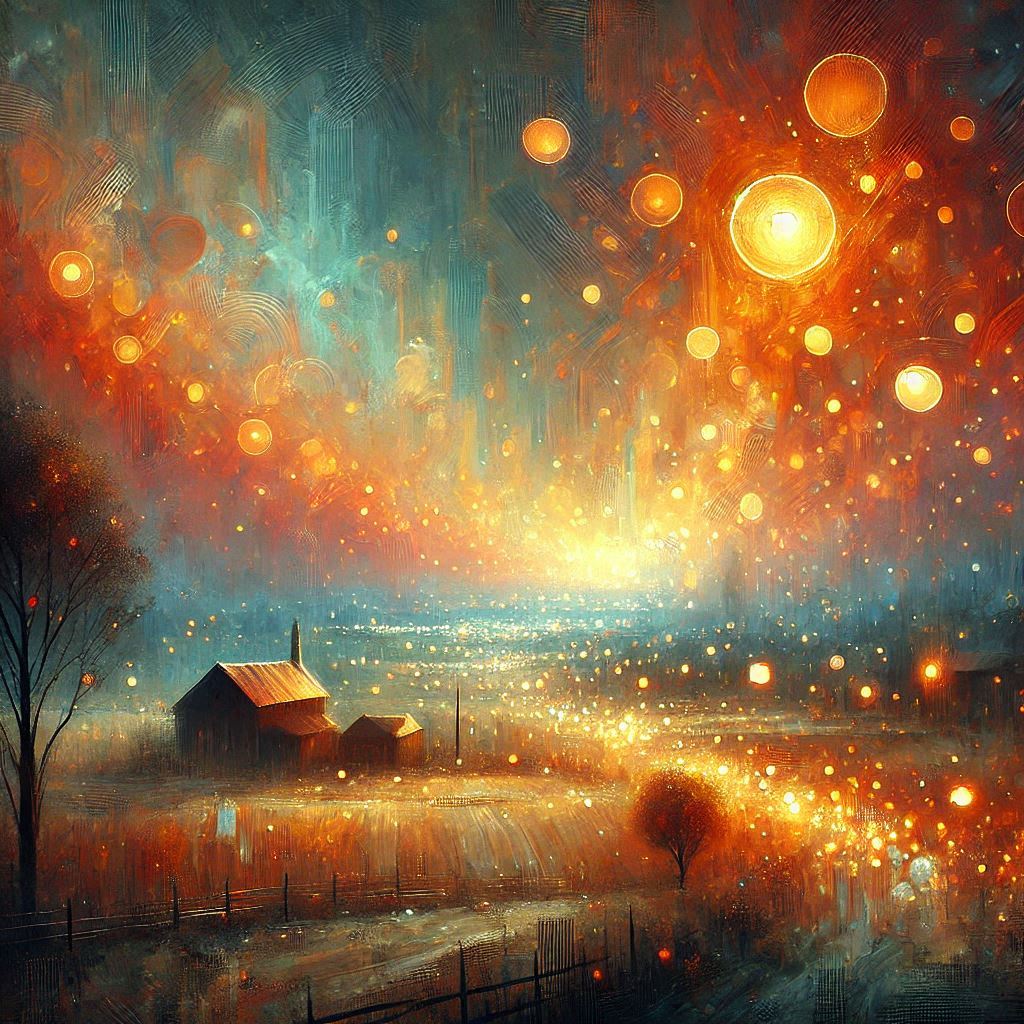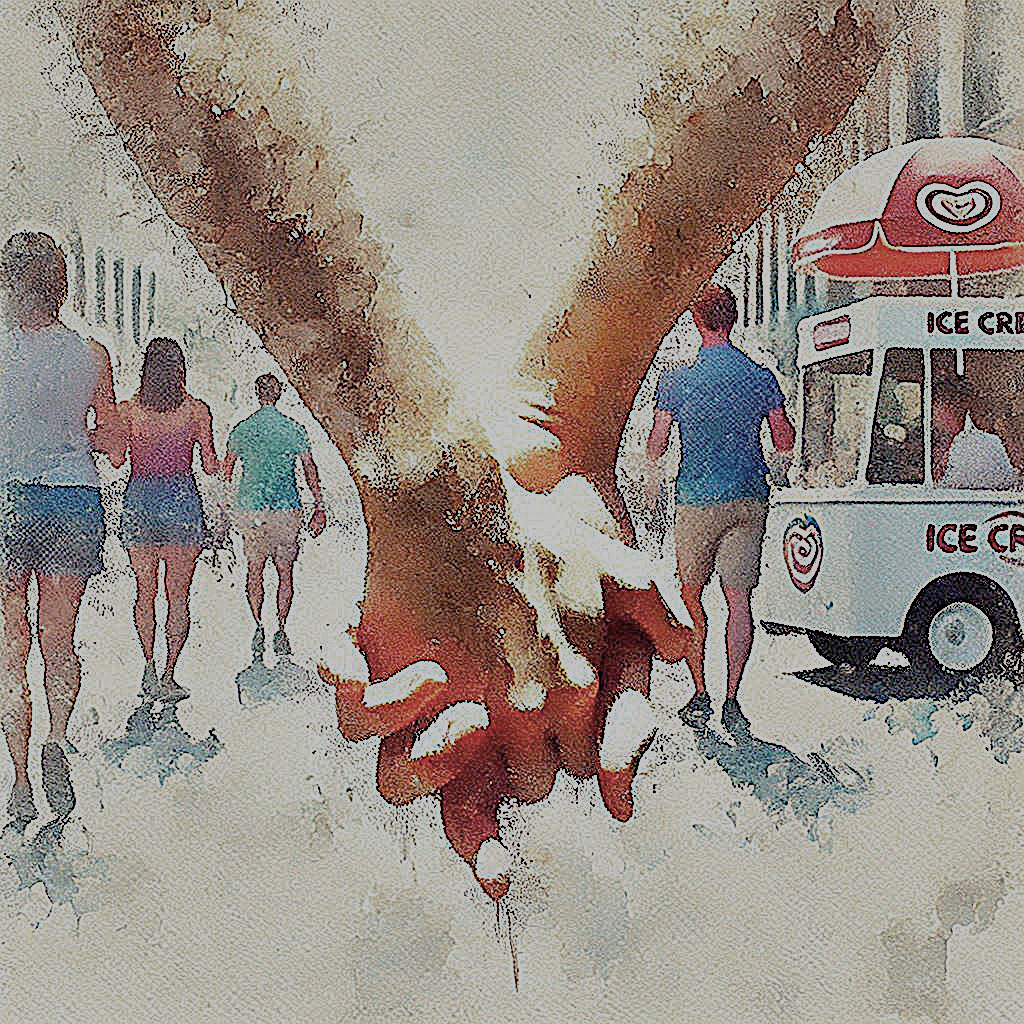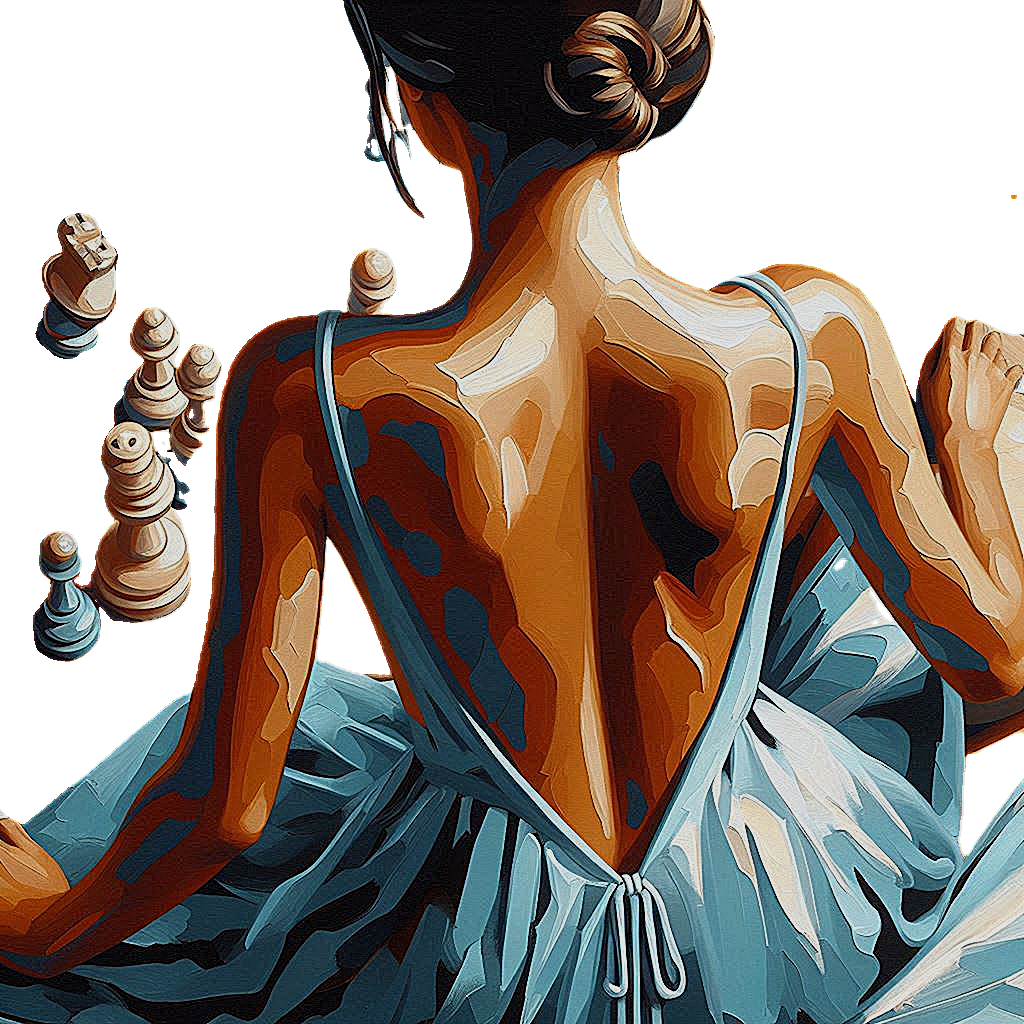
The Thing That Is Not Her Son
Her life is an empty stage. She stands at the center of it, paralyzed in the spotlight.
She feels the terror of the deer, the fox, the dog, moments before something incomprehensible hits. Peering into the blinding darkness, trying to figure out what’s on the other side – but she can’t.
Enter the police.
“Your son was found in the woods. He’s alive and well!”
Here on her stage the walls are non-existent – nothing remains of what once made up their home – and she can see him anywhere, constantly – this child wandering about her life.
He has her son’s legs, his hands, his eyes and mouth. But he is not her son. He is not her son.
This other child does not walk the way her son used to, he doesn’t touch things the way he used to, he doesn’t speak the way he used to. He doesn’t speak at all.
“It’s the shock,” they say. “Traumatic experiences can affect us in ways that change our behavior and even our physical appearance. This is your son.”
The mother studies her son’s face. Or rather, the face that belongs – belonged – to her son, and that this other thing is now wearing. Everything is exactly the same except it’s fake – a perfect replica.
At night (and the spotlight never goes out, humming, buzzing, burning her eyes, nailing white-hot thoughts to her temples), at night she stands there at the foot of the small bed, in her child’s bedroom, and she watches the thing in the bed breathe softly under the covers, and she knows it is pretending – pretending to sleep, to be her son, to be a child.
At night, she draws closer and asks the thing that is not her son: “What are you?”
But it never answers.
In the mornings, she finds the small bed empty. The sheets where her son used to sleep – with comic book characters printed over them – are covered in dirt like some ancient shroud.
“Episodes of sleepwalking are a fairly common consequence of trauma,” they say. These figures take turns on her stage – the psychologist, the social worker, the doctor – and she’s never able to recognize their face. (Maybe they have none.) Featureless masks at the edge of her vision. And sometimes they’re not even that, just echoes reverberating through her emptiness.
“You should shut all the doors to avoid accidents. We wouldn’t want him to go out and get lost again”.
The implication is left to rot under the spotlight like roadkill: she is a bad mother. It’s her fault. She shouldn’t have let him come home from school alone. It is her fault her baby boy is gone, replaced by this thing.
And the mother knows that she is a bad mother, but she also knows that this child-shaped thing belongs to the earth in a way that only she can truly understand.
The soles of its feet are naturally dirty with earth. The crescents of its nails, black. It dug to get out. Earth in its hair, and twigs, and leaves – a sort of wild crown – and earth in its mouth instead of words.
As she washes it in the bathtub, with care and disgust, she sometimes thinks she can make out a strange root, half-submerged in swampy green waters – an ancient thing, forgotten, that no one has ever loved.
“Is that why you came here?” she whispers to it in secret. Perhaps love burns like a flame and this thing is some kind of impossible moth that is attracted to it. Perhaps it is as a cuckoo that slips into empty nests to be fed and loved. “I can love you,” the mother whispers in the blackness of its ear, full of earth. “I can love you if you tell me where he is. Do you know where? Do you know what happened to him? My child. My child.”
Her son-shaped thing never answers. It looks back at her with pits instead of eyes, black and bottomless. She digs deeper and deeper into them – clawing, searching – and she knows that one day she won’t be able to re-emerge.
And again, the mother catches herself staring into the darkness ahead.
She feels whoever is attending her play must also be responsible for it. She’d want to lash out at her audience, but she never sees anyone.
She blinks and imagines them, her executioners, sitting in the front row. Faceless, formless – only eyes.
“Was he afraid?” she asks the thing that is not her son.
She closes her eyes under the cruel light to see her baby boy smiling – the dimple on his left cheek, the little windows between his milk teeth. She keeps them in the drawer, his teeth, and counts them over and over: each window left forever open, like the ones in an empty house – abandoned, haunted.
“Did you hold his hand while he died?”
She’s holding its hand – this tiny hand, its substance molded into shape. A hand that emerged from the earth.
Maybe – she ponders, hope as a flickering lightbulb – if this thing was born from the earth, then her child can also be reborn from it.
If she were to open her drawer and pick up one of his little teeth – a deathly white seed – and plant it as in some forgotten ritual. If he could grow from the seed of what he was, if he could grow into a tree, then each fruit would contain his soul.
But nothing grows on her stage, except for a dead tree.
It has appeared under the spotlight as though it had always been there. From it, rotten apples grow.
She plucks an apple from one skeletal branch. She feels compelled to do so, even as her hand is shaking. It is heavier than it looks, the apple, heavier than it should be. The mother bites it and it bleeds into her mouth.
Tasting death, she slowly lowers her gaze to look at the thing in her hand, and as she does so the bitten apple looks back at her through empty eye sockets.
She lets go of it, and it rolls off like a severed head.
“Tell me where he is. Tell me where my son is”.
Black eyes look at her. She sees herself reflected at the bottom of those pits.
And as the thing touches her, dries her tears, it seems to her that its tiny fingers, root-like, are absorbing, drinking them.
The mother washes it, feeds it, takes care of it. Under the spotlight, always the same – the mother washes it, feeds it, takes care of it.
But is she still a mother if she no longer has a child?
The non-mother and the non-child are alone on the deserted stage.
And she washes the thing, but it is useless, because the dirt always comes back. She feeds it, but the thing doesn’t need it, because it seems to be hungry for something that isn’t food. And she takes care of it. It is the love it draws from her, its nourishment. Small roots sink into the mother’s heart.
The thing that is not her son looks healthier, realer, as she becomes emptier and emptier. In her house without walls she can see the thing’s black gaze settle on her, almost sweetly, as it feeds off her.
When it takes her hand, it is a slow gesture – clumsy in the way deliberate things are. Unnatural.
Is that how it’s done?, her son’s eyes seem to ask – his black eyes that this thing hides behind, using them to communicate with her. Is that how he did it?
It is practicing.
Sometimes, at night, she is too exhausted to stay awake.
Under the ever-buzzing spotlight, struggling against the weight of her own eyelids, she watches it sneak into her bed and snuggle up against her.
Before she disappears into sleep, she can almost pretend – if it weren’t for that smell.
Earth.
Her child is waiting for her on the other side.
The forest is a dark backdrop. Ancient hills made of earth and roots, of time and dead, beech trees covering them in autumn glory.
Everything here takes place in the shade of the forest – every life, inside of every house, inside of every hole.
Is this a part of her stage as well, she wonders, or is it the other way around?
She always has the same dream.
She embalmed this particular day in her memory – forever preserved, a perfect corpse. She put it in a jar to look at it in horror, because the horror of his absence is the only thing she has left of him.
The day someone harms her child.
It always goes like this: her son is coming home from school, he walks along the white road in the woods. He knows the path like the back of his hand. He loves it here.
And then someone calls his name. Why shouldn’t he turn around? – don’t turn around! – He does.
The mother sees her child’s smile, the dimple on his left cheek, the open windows of his milk teeth.
He is alone.
She is not with him to protect him, she is not with him when he needs her most. He calls to her, but she doesn’t answer because she can’t hear him – no sixth sense, no ancestral maternal instinct leads her to him in the one moment that truly matters. She ceases to be a mother that day, in that instant.
Her son is afraid, in those last moments. He moves weakly among the leaves, in the earth. Dying.
His eyes slowly stop seeing. They are emptying, filling with thick nothingness.
Then, something comes out of the forest floor. The thing has seen what happened. It approaches her son slowly, without being human.
It touches her baby in the only way that it can, a clumsy but light touch. It brushes his hair away from his forehead leaving, in turn, a smear of earth.
And her child is afraid only for a moment longer – then he stops. He stops.
His eyes are hollow pits.
The mother wakes up and cries silently under the spotlight that has replaced the sun.
Enter the priest.
“I have come to visit you. I wanted to see how you were, both of you.”
The priest is quite young. He looks nice – nervous, in a way that could be endearing.
His church is in the forest and the church is also on her stage, it fits there comfortably, under autumn-laden trees, their roots sinking into the earth, infinitely underground. (Those same trees her son used to walk under and then disappeared under. The same earth he used to tread and then swallowed him whole.)
The priest and the thing that is not her son look at each other.
On her stage, the relentless spotlight makes the drops of sweat crawling on the priest’s skin glisten as his Adam’s apple struggles against the white collar.
A new scene could take place now.
She would remain in the shadows, and the priest would be frozen in the light – terror on his face as he looks at the child who shouldn’t exist. (Terror in his eyes moments before something incomprehensible hits.)
Later, after a pleasant conversation – two chairs on the stage – the priest kisses her goodbye on both cheeks.
Right then her skin turns to bark.
His scent hits her nostrils. He’s wearing some kind of perfume. It reaches the front of her brain and stabs it – a throbbing headache.
She is then certain of something: if the priest were to walk through the woods, his foul cologne would leave behind a trail, an almost visible smell. Like a living thing it would slither through the trees – those trees his son was walking under, that day.
Did her child smell it too, close and vile and suffocating?
“I know it must difficult for the two of you” the priest whispers in her ear, his lips almost touching her. “But this is a wonderful gift. A gift from the Lord. In His mercy, He saw fit to grant it to you.” His black hair, feather-soft, is on her face. “The Lord has brought your boy back to you, safe and sound. It is nothing short of a miracle.” His voice trembles, as if this is something terrifying. “A miracle.”
She screams but nothing comes out.
“Was it him?” she asks in the night to the thing that is not her son, as the spotlight keeps staring at them, unblinking. “Please tell me. Tell me if he hurt my baby. I know you know it.”
The non-son takes the non-mother’s hand between his – small, dirty – and she can almost feel the earth on them.
The scene changes.
A little white church rests in the woods – and now, suddenly, it seems to her that it shouldn’t be there at all.
It is a foreign body around which the trees have coagulated to prevent it from spreading, roots snaking underground, whispering in their secret tongue. The woods have been trying to get rid of it for a long time now, but the little white church is stronger than it looks. The minds of men changed one day, gave it power, and now the woods are hurting. The things that once existed in the crevices between trees, leaves, reality are no longer. Only something still exists – hardly – pale and forgotten.
The church somehow appears more real than the trees around it.
But the church doesn’t have any walls either, and inside, she can see the priest hiding. He’s rocking back and forth on his knees, his hands folded in prayer, and he’s trembling, crying. “God, please. God, please.”
Her non-child points with his finger – filaments are growing out of it, as thin as hairs – and the roots of giant trees creep under the floorboards, creaking violently, wrapping around the priest, and as the forest eats him he never stops pleading. “God please, please. Help me. God, have mercy on me. Help me. Help me.”
But nobody helps him.
Nobody helped her child.
The roots crush, break, drag him. Underground.
He is gone, eaten. And his church will be digested as well. Trees will grow back where men once prayed, and perhaps, in time, they shall pray once more. To a different god, one that is not human.
The thing that is not her son lowers his hand – by now it looks less and less like a hand – and when he turns to her, his face – the face that belonged to her little boy – is gone.
The non-mother wakes up with a start in the little bed.
This once, she doesn’t feel the thing’s gaze on her. A trail of muddy footprints leads offstage.
It is gone. She is alone.
She looks around squinting in the artificial light, shielding her eyes as they burn. She peers into the darkness, the fourth wall of her prison.
And she can see it now – what the darkness is, what it has always been.
There is no one watching her, yet eyes are everywhere. A formless, faceless audience, as thick as a black wall. Trees.
No, the forest was never on her stage after all. All along it had contained her stage, her life being something so infinitely small the forest had barely noticed it. (Trees loom over her. Roots snake underground.)
And now the play is over.
Suggested Reading
-
about Lollipop, Lollipop![Lollipop]()
Featured • Fiction • Nonfiction
Lollipop, Lollipop
The figure moved slowly, deliberately, its shrouded head turning towards Josh. Those eyes—sharp and frigid as icepicks—stared at him. The man’s black lips never moved, even as a word pierced him like a yell: “Beware.”
Featured • Fiction • Nonfiction
-
Featured • Fiction
-
Fiction



